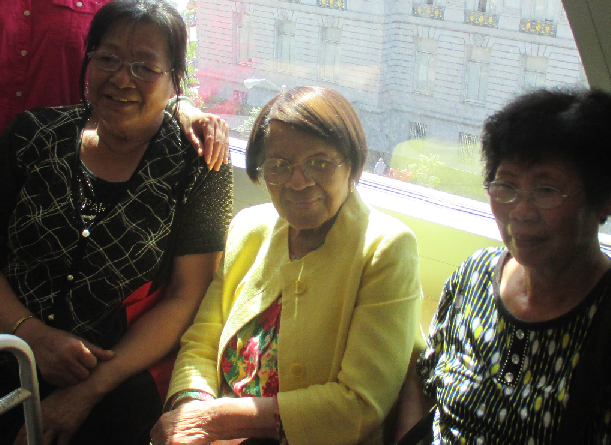The 99-year old who is facing eviction got at least a one-week reprieve today, and there may be a deal to keep her in her apartment for the rest of her life.
But there are sticking points, including the insistence by the landlord that Iris Canada sign away any rights she may have to the property so that he can convert it to a condo.

The hearing this morning before Judge James Robertson, who is known as a property-rights conservative, was a bit wild.
At first, the judge issued a tentative ruling that would have allowed Iris Canada to stave off eviction – but only if she agreed to pay the attorney’s fees of the landlord (as much as $150,000) and apologize for her actions in defense of her home.
That wasn’t going to work, since by no account does Canada have anything close to the money to pay those fees.
Her attorney from the Homeless Advocacy Project, Mike Spalding, was joined at the last minute by Steven Adair MacDonald, a lawyer who does both landlord and tenant representation and who said he had a good relationship with the landlord’s counsel, the notorious eviction lawyer Andrew Zacks,
MacDonald told the judge that he thought he could settle the case, and while Zacks called his client to try to figure out if the tentative ruling was acceptable, MacDonald went about trying to cut a deal.
After about half an hour, MacDonald told the court that “we have settled the case.”
The terms: Landlord Peter Owens would waive the legal fees and allow Canada to stay in her apartment (although she wouldn’t be allowed to have any live-in support, which seems kind of counterproductive since in the past Owens has expressed concerns about her ability to live alone).
In exchange, Canada would sign the paperwork that’s necessary to allow Owens to convert the building to condos.
That’s a big, big deal here: Canada lives in a six-unit building that is owned jointly by Owens and five other parties as a tenancy in common. The building is eligible for condo conversion – which would make this unit easier to sell and far more valuable. Condo conversion is worth hundreds of thousands of dollars to the owner.
But Canada stands in the way. When Owens tried to evict her years ago, her lawyer at the time, Steven Collier, won an agreement giving her a lifetime tenancy, also known as a “life estate,” which is recorded as an interest in the property. So Owens can’t sell or convert unless Canada signs that interest away.

Some family members, including Iris Merriouns, who is Canada’s niece, say she has another valuable right: Under the city’s condo conversion law, Canada, as a tenant, has a right of first refusal to buy the place.
So Merriouns isn’t so sure that Canada should sign away any possible ownership interest she might have in the place.
That created a lot of discussion both in the courtroom and in the halls outside, as MacDonald tried to convince the family members to tell Canada to accept the deal.
But Canada wasn’t ready to say that she understood what the deal actually involved, and Zacks refused to sign off unless the 99-year-old would say on the record to the judge that she agreed to all the terms.
Merriouns was pretty adamant that there should be no apology – and Zacks later told reporters that the apology wasn’t the sticking point and that he thought his client would be willing to waive it.
So the case was continued for another week while the lawyers and the family try to work out the details.
Both Zacks and MacDonald said afterward that they were confident a settlement could be reached.
Tommi Avicolli Mecca, the organizer with the Housing Rights Committee who helped turn this into a national story, said he thought the ruling and the negotiations were a victory. “The bottom line for me is that she should get to stay,” he told reporters. The fact that a very conservative judge was willing to vacate a former eviction order, Mecca said, “shows the power of organizing.”






